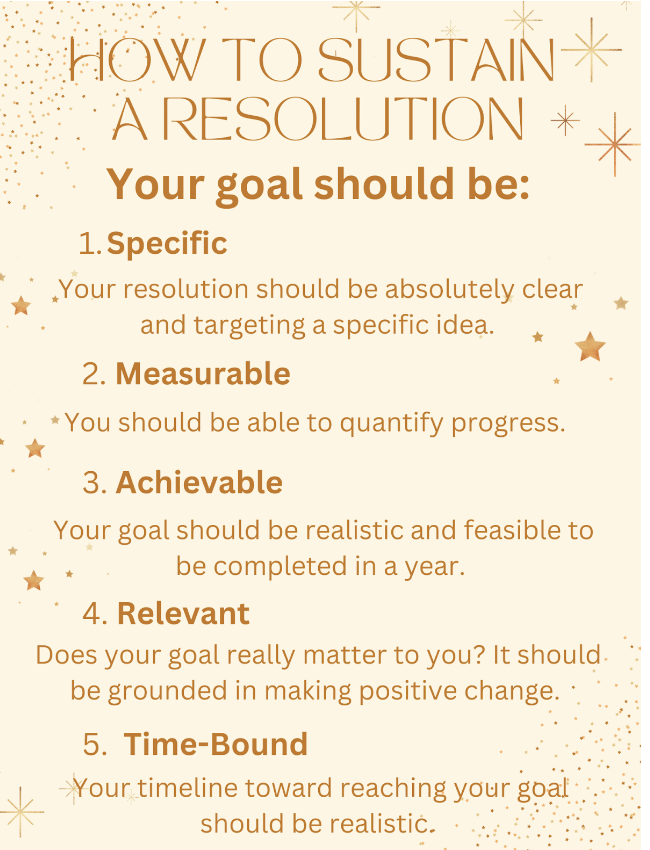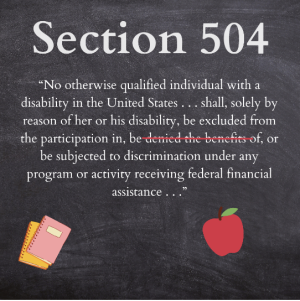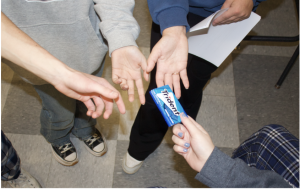New Year’s resolutions prompt self-reflection, growth
According to FranklinCovey, approximately one third of resolutioners give up on their goals before the end of January, typically because of a lack of personal passion (i.e., setting a goal to conform to societal standards or pressures), practicality or specificity. However, by following the above steps when setting a goal—known as the “SMART” method, developed by the journal Management Review in 1981—you may be more likely to follow through with your resolution. All information taken from “How to Make (and Keep) a New Year’s Resolution),” New York Times
I rang in New Year’s by sleeping. In fact, I was asleep before midnight, meaning I indeed missed the Times Square Ball Drop, midnight fireworks and celebratory toasts to 2023.
While many may find my evening to be rather dull, paling in comparison to their own spirited gatherings and parties, this is what a typical New Year’s Eve has looked like for me, give or take, throughout my life thus far.
For whatever reason, my family has never grandly celebrated New Year’s Eve. This isn’t because we’re opposed to observing the holiday or expressing relief and excitement for the year ahead—trust me, we’re all glad that 2022 is over—but we simply choose to celebrate differently and more casually. Keeping true to our lack of “standard” New Year’s festivities, we typically don’t plan or share New Year’s resolutions with one another (again, not because we’re averse to them; establishing resolutions is just not a tradition that we collectively practice).
However, last year, I decided that I would make an attempt to fulfill a personal resolution, and I’ve since determined that such resolutions are not as cliche or trivial as they may seem. In fact, I believe that resolutions can be valuable tools that elicit self-reflection, positive growth and heightened awareness—assuming that you commit yourself to following through with them.
Recognizing that the year ahead of me was going to be particularly stressful (this was in January 2022, to clarify) as my future self would be navigating college admissions, a wearing course load and various after-school activities, I figured that one of the most feasible—and still effective—options would be to write a monthly check-in with myself, discussing virtually whatever I wanted to for as long, or short, as I had time or energy for. After all, I’ve always found writing to be a therapeutic outlet for expressing myself; I didn’t think anything would inhibit me from accomplishing my goal.
And I was right—twelve months later I’ve proudly accumulated a dozen distinct entries that chronicle my experiences, emotions and hopes for the following month. As I look back on my memories from last year, I’m able to relive memories that have had tremendous impacts on my present-day life as well as memories that I’ve since forgotten, but are still endearing, entertaining and meaningful nonetheless.
While it can be both amusing and difficult to reminisce on the past year, overall, I’ve found it to be rewarding—and important—to use my journal to self-reflect and gain a stronger sense of perspective. It can be easy to dismiss one’s accomplishments and improvements in comparison to challenges or defeats; yet, my writing immortalizes my feelings of excitement, euphoria and relief upon completing a significant goal or achieving one of my aspirations, all of which, over time, have since become normalized in my life. Consequently, I’m able to express more gratitude for my accomplishments, time spent with family and friends and setbacks which have challenged and pushed me to think or act differently.
Once again, my resolution for this upcoming year is to continue my monthly diary. Although I may sleep through next year’s traditional festivities again, perhaps I’ve made a tradition of my own through my New Year’s resolutions.

Editor-in-Chief Julia Herlyn ’23 enjoys music. She’s been playing violin for nine years both in school with the Symphonic Orchestra and Chamber Orchestra...




















































